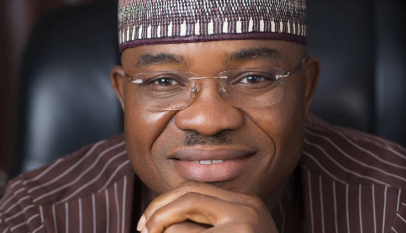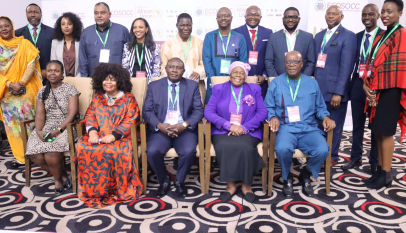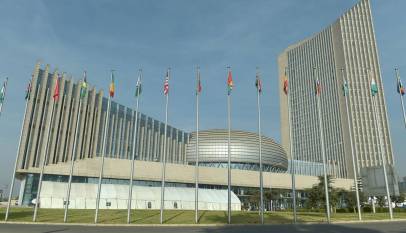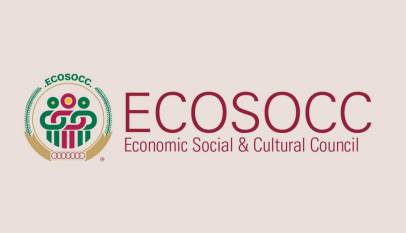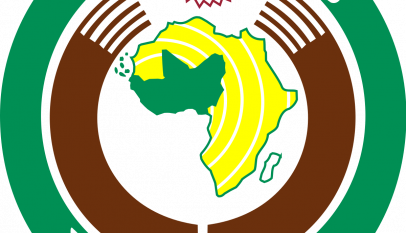Counting the gains of AU ECOSOCC-AfDB COVID-19 awareness webinar series
In March, following the outbreak of the COVID-19 in Africa, the AU Economic, Social and Cultural Council (AU-ECOSOCC) and African Development Bank’s Gender, Women and Civil Society Department (AfDB-AHGC), initiated a webinar series aimed at raising awareness and sensitizing African citizens about the pandemic.
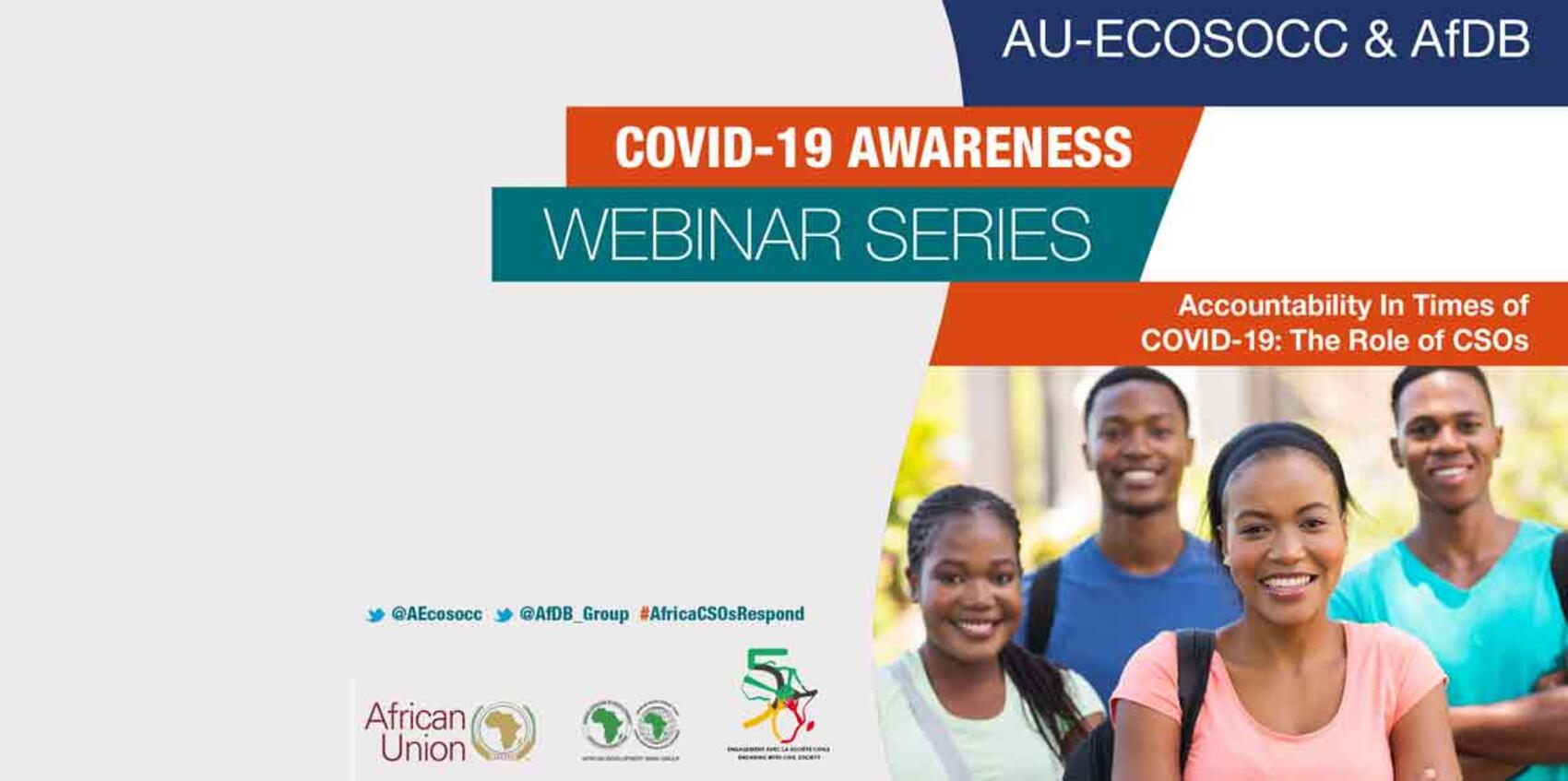
The webinars bring together its primary targets, Civil Society Organisations (CSOs) but also community leaders, government representatives, and representatives of international organizations. This is to strengthen the relation between duty bearers and right holders as well as strengthen community engagement during the post-COVID19 reconstruction agenda.
They also offer a platform to combat the spread of misinformation as well as sharing lessons from the interventions that various CSOs from across the continent are undertaking at subnational and national levels, in response to the pandemic, albeit under extremely difficult conditions. Also, the webinars offer opportunities for drawing lessons on what is working and what more needs to be done so as to save lives and build community resilience.
Consequently, the first phase of the webinar series had focused on the outbreak of the pandemic and its resultant emergency response, addressing themes such as health and sanitation, information and misinformation, the frontline experiences of CSOs, resource mobilization, gender mainstreaming as well as the use of innovative technology and ICTs in the context of COVID-19.
Now, as the continental response to the pandemic transitions from emergency response to recovery and long-term reconstruction, the second phase of the webinar series is focusing on themes central to facilitating recovery, building resilience, and adapting institutions and systems to the realities of post-COVID-19 socio-economics in Africa. Subsequently, the second phase is addressing diverse themes such as accountability, solidarity, youth, education, health infrastructures, and the African Continental Free Trade Area (ACFTA).
As the webinar series transition to its second phase, AU ECOSOCC lately launched a Report documenting the milestones achieved by the first phase of the webinar discussions. It identified lessons learned, experiences to be scaled up and avenues of advocacy to boost citizens’ contribution to the COVID-19 pandemic response in Africa. The Report was launched by Ambassador Abdoulaye Diop, Chief of Staff at the Bureau of the Chairperson of the African Union Commission.
In his remarks, Ambassador Diop said the outbreak of the COVID-19 pandemic in Africa was an unprecedented crisis that was from its onset, met with “an unprecedented collective response” from the African Union through the Africa Centres for Disease Control (Africa CDC) and the AU Commission’s Department of Social Affairs (DSA).
Diop noted the AU Commission’s appreciation of the civil society’s critical role in Africa’s response and recovery efforts against the pandemic, describing members of the civil society as advocates, watchdogs and trusted authority. “I wish to state that the AU attaches the highest significance to the contribution of the civil society in the policy process of the AU, as stipulated in the Constitutive Act of the Union. As the technical advisory organ of the AU, it is imperative to see the critical role you are playing in the fight against the pandemic.”
While recalling the AU’s response efforts in the early days of the pandemic, Diop said as early as February, the Union had convened a meeting of the African ministers of health in Addis Ababa, where they came up with the Africa Joint Continental Strategy for COVID-19. The strategy, he said, comprised the African Union COVID-19 Response Fund, which aims to raise resources to strengthen the continental response to COVID-19.
Others were the Partnership to Accelerate COVID-19 Testing (PACT): Trace, Test & Track (CDC-T3); the Africa Medical Supplies Platform (AMSP), to mobilize guaranteed supply of COVID-19-related critical medical equipment to AU countries; as well as the appointment of AU COVID-19 Envoys, to mobilise international support for addressing the economic challenges African countries will face as a result of the COVID-19 pandemic.
“As we move towards setting the recovery phase of the pandemic, your policy recommendations are important in setting the agenda for the next phase, to chart an appropriate way. The array of skills and expertise gathered from the civil society family, within and outside of ECOSOCC, give us the confidence that this report will be of relevance to member states and the African people,” he said.
While also speaking at the launch, H.E. Bineta Diop, AU Special Envoy on Women, Peace and Security, said whereas the number of COVID-19 infections in Africa were spread almost equally between the male and female genders, women and girls were more disproportionately impacted by the negative consequences of the pandemic, thus, the need for gender-specific responses to the pandemic, during the recovery phase.
Mme Diop alluded to the now established reality that women-led countries were more proactive and effective in their response to the pandemic, arguing for the need for women to be “on the driving seat” of African countries’ response to the pandemic. “We need to make sure women are also in the driving seat of the response to the pandemic at all levels. Also, without civil society mobilization in COVID-19 responses, Africa will miss an opportunity to build synergies and leapfrog the identified solutions,” she said.
The AU Envoy described the pandemic as a period that required bringing all stakeholders – civil society, private sector, government and communities – into the same response platform. “There is an ample evidence in this Report that civil society brings an added value, and will therefore play a pivotal role within such a platform; they are closer to the people and well-positioned to depend their interest. In this turning point of the fight against the pandemic, civil society must have a seat at the table to contribute to the design of Africa’s strategy (that is why we are sitting together today) and also contribute in the interventions.”
Richard Ssewakiryanga, executive director of the MS Training Center for Development Cooperation (MS-TCDC) cum former presiding officer of AU ECOSOCC, described the Report as timely adding that it offered the African civil society an opportunity to engage in critical advocacy issues. He, therefore, urged African CSOs to domesticate and translate the report into processes that speak to the needs of African citizens.
“This pandemic has also led to new kinds of partnerships, here in Uganda, the Prime Minister has set up a COVID-19 taskforce and people from civil society like me were asked to sit on it. In each of the districts, there are taskforces and members of the civil society are part of them. And this is being rolled out in many parts of Africa, which is a new unprecedented partnership being formed in response to the pandemic,” said Mr Ssewakiryanga.
Ms. Julie Kone, chairperson of the AU ECOSOCC Cluster Committee on Gender and Women’s Development, said governments across the continent were under obligation to support women’s leadership and equitable representation in decision-making processes on COVID-19. She also called on African governments to ensure the pandemic did not ultimately aggravate other areas of vulnerability for women and girls, including women’s reproductive health, child marriages and domestic violence.
“There is need for governments and development partners to strengthen protection from gender-based violence through concrete policy and administrative interventions. These must include the establishment of reporting toll-free hotlines; the provision of pyschosocial support for victims of gender-based violence as well as the creation of special victims’ units in police departments and the court systems,” advised Ms Kone.
Likewise, Emmanuel Abdulai, chairperson of AU ECOSOCC Cluster Committee on Political Affairs, said the pandemic had hampered Africa’s decades of efforts to achieve regional integration which had given birth to Regional Economic Communities (RECs) and the African Continental Free Trade Area (AfCFTA). Consequently, he said, COVID-19 had had negative effects on intra-African trade, the free movement of people, goods and services as well as the aviation industry.
Furthermore, Abdulai urged African civil societies to engage in purposive and constructive engagement with governments and desist from being adversarial, so as to ensure African citizens benefit from policies of the AU and its RECs. “National response strategies are necessary but not sufficient to achieve the timely eradication of COVID-19. Countries took actions but open border systems in certain regional blocks made it difficult for countries to arrest the spread. In order to address the pandemic, there has to be a regional approach,” he added.
In his closing remarks, Denise Kodhe, acting presiding officer of AU ECOSOCC, said as governments across Africa began to ease up COVID-19 restrictions, there was need for the creation of a common front between government and civil society, which would allow the civil society the opportunity to play its very important role of sensitizing the people about government initiatives. “We must find a way of educating our citizens, we must find a way of arming our citizens with the right information.”
As African countries transition to the recovery phase, the Report said, it would be imperative “to increase pandemic resilience through a thoughtful and holistic investment in state institutions at all levels of government through improvements in health infrastructure, technology, and most of all, human resource expertise.” It added that governments and civil society actors had a collective responsibility “to establish new relationships, identify innovative models for collaboration, and earn trust with one another in order to construct a new partnership that is mutually reinforcing and in the best interest of the public.”
You may wish to download a copy of the report of first phase of AU ECOSOCC-AfDB COVID-19 awareness webinar series here


